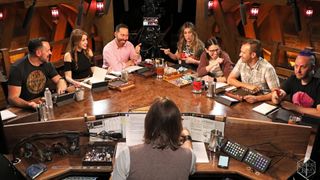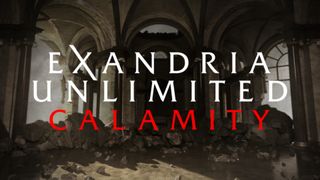Critical Role on breaking their world for art
Interview | "...then we found ourselves getting to the third campaign, I was like, 'Oh, now we're gonna get real weird.'"

"That’s the thing with these live shows,” Sam Riegel tells me, when we sit down to talk about Critical Role ahead of their live show in London, their first outside the US. “We don’t do anything. There’s no pyrotechnics. We don’t even move, we’re just sitting in chairs. It’s arguably not a good show."
He grins, and the rest of us - Marisha Ray, Matt Mercer, and Travis Willingham - laugh. Even now, after these nerdy-ass voice actors have been streaming their D&D game for a global audience for almost a decade, after a record-breaking kickstarter, after selling out Wembley Arena’s 12,000 seats in less than 6 minutes, they still seem amazed by the popularity of Critical Role.
Matt sums it up nicely: "For me as a role-playing game nerd my entire life, it’s exciting to be like 'That’s right, we’re bringing tabletop games to the level of rockstars.' But on the other hand, that makes no sense."
I can’t help but ask whether their growth feels natural, or whether they ever get the sense that their skipping steps, taking such dramatic leaps forward.
It’s not about playing the perfect game. It’s about telling a good story
Marisha Ray
"We take a cautious progression through things," Travis says. "[...] When these sorts of shows [Wembley] happen, it naturally brings about the question: can we do this again? Can we do it in other cities and reach out to a larger audience that we’ve been lucky enough to have across the world?"
The global spread of Critical Role is becoming reflective of the campaigns they’re telling too, as events from the current campaign three, starring Bell’s Hells, are affecting all of Exandria. Fans are seeing many familiar player characters, NPCs, and locations return, and the threat of Predathos (terrifyingly titled the God-Eater) to the deities of Exandria might have had an even bigger effect on their past characters.
"Some of the members of Vox Machina and Mighty Nein," Sam says, "if they could talk to Bell’s Hells, would probably be like: 'What are you guys doing? Get up there and save the gods! What’s wrong with you?'"
Sign up to the GamesRadar+ Newsletter
Weekly digests, tales from the communities you love, and more
Going cosmic

This expansion, the crossovers, the scale and threat of it, is clearly something that excites them.
"I love re-examining characters from the past," Sam tells me. "And I’m fine with my characters not having happy endings, because they’re fictional. [...] As artists, even though D&D isn’t really an art, you create something and you want it to live on. If our character’s show up in other people’s home games around the world as NPCs, that’s so cool to me because that’s something we created that gets to live on in other people’s imaginations. Even if it means Scanlan dies in somebody’s home campaign, or if Fjord is the bad guy of somebody else’s home campaign."
"Fjord kills Scanlan," Travis laughs, "that son of a bitch. He made a pass at Jester."

Critical Role's latest endeavour is Candela Obscura, an eerie horror series powered by its own system. You can get an exclusive first look at some of its pages here.
Marisha makes a face when Sam says D&D isn’t an art.
"We built these characters," she says, "and like a piece of art, it does kind of take on a life of its own, and it's really incredible to watch it continue to run and breathe without you. [...] You get removed from this sense of ownership in a weird way because they do kind of turn into their own living, breathing people."
The cast's enthusiasm for playing in a shared world, not just across their own campaigns, but across other people’s campaigns too, is apparent. Matt especially seems really proud of the way everything is coming together, and the narrative that is unfolding across all of Exandria.
"It’s global,’ he says, ‘beyond global."
"Is it celestial now?" asks Travis. "Is that the encompassing term?"
Almost together, with glee, Marisha and Sam both offer an alternate: "It’s cosmic!"
Because of that cosmic nature, because they are drawing in elements from past campaigns, campaign three has begun to feel like something of an endgame – an end of an era for Exandria, and perhaps for Critical Role too.
We found ourselves getting to the third campaign, [and] I was like, "Oh, now we're gonna get real weird."
Matt Mercer
That’s something Matt is intentionally doing. "I’ve always had this dream of having a consistent game group to play multiple campaigns in the same world and be able to weave decisions made in previous campaigns that affect future campaigns, and really kind of show the influence that their choices and characters have made through generations or through periods of time. This is the only opportunity I've had to do that. And then we found ourselves getting to the third campaign, I was like, 'Oh, now we're gonna get real weird.'"
"Matt has done such a good job at really signalling to us at any given point in time that the world keeps turning, and people keep moving forward, and they make actions," Marisha says. "If you take too long, things will happen."
Calamitous curtains

"The thing that scares me most about the stuff we’re getting into in campaign three,” Sam says, “is people do play home games in the world of Exandria. Are we going to destroy the world for them?"
"Hey, man," Matt answers, a rueful smile on his face. "I didn’t tell them to play there. And to be fair, nothing feels cooler than dropping a Chroma Conclave moment on a community."
"But how cool would it be, for both GM and players," Matt continues, "to be running a certain story and then have this happen, and now they all react off of what’s happening. For me as a GM at home, that would be a cool opportunity - it’s like an improv baton pass from a whole different group of people."
They’re in unanimous agreement. Again, the draw of playing in a collective imagination seems to hold a great appeal for them all.
Good art is temporary. It should be about building something that is important in the moment, and shouldn’t be built with the pure idea of longevity. It’s experiencing it now, and for me, I love building something and then breaking it for the sake of art
Matt Mercer
"It’s their own little Rogue One," Marisha adds.
"And also," Matt’s quick to offer, "they could also just say: 'Ignore them [Critical Role]. We’re canon.' And that’s entirely viable."
I voice the thoughts rumbling in the community that the events of campaign three are turning apocalyptic in vibe. I ask whether Matt would do it – whether he would pull the trigger on something like that if the characters failed to stop it."Yes," he says. "That's what I love about this. I never had a chance to do stuff like this. And now that I can, it's scary and exciting at the same time. [...] I don't know if it'll work, but I'm trying my best."
"This could end up feeling like a new Calamity, like a Calamity 2.0," Marisha picks up. "Who knows? Maybe we’re rocking towards something like that."
Matt gives that smile again: "I don’t know what you’re talking about."

If we're heading toward another apocalyptic event, things are going to get shaken up in a big way - but that introduces its own kind of opportunity, as Riegal explained when we caught up with him about Critical Role Calamity in 2022.
A cynical approach though might be to suggest that even if events in-game look like Calamity 2.0 is just around the corner, the company that is Critical Role surely would not drop an armageddon on the world they’ve been building together for nearly ten years, a world that has enabled multiple other lucrative projects, including books and spin-off games… would they?
"As long as it’s a really good story, an honest story," Sam thinks, "that isn’t just being written because it’s wild or interesting or gets a laugh in an auditorium, but a really good story, then the rest of the stuff we can figure out later."
Matt agrees. "Good art is temporary. It should be about building something that is important in the moment, and shouldn’t be built with the pure idea of longevity. It’s experiencing it now, and for me, I love building something and then breaking it for the sake of art."
"You’re so Banksy," Sam jokes, and they all laugh with him.
Marisha adds: "It’s not about playing the perfect game. It’s about telling a good story."
For recommendations on what you should play while you wait for the next episode of Critical Role, check out our guide to the best tabletop RPGs.
Most Popular



